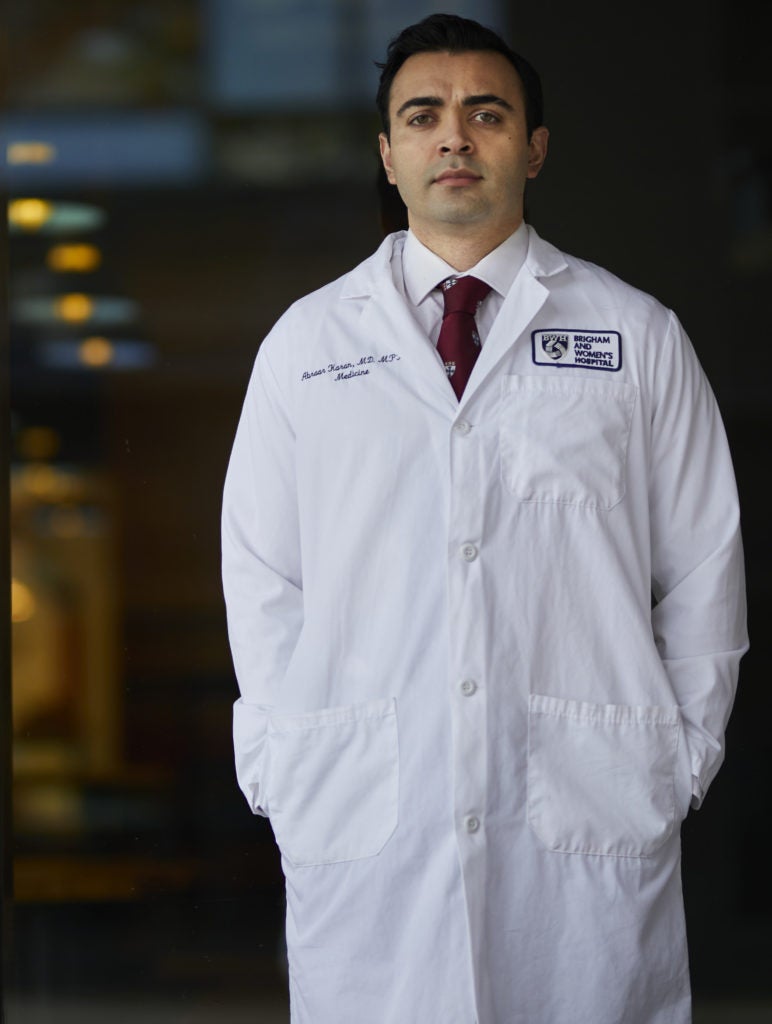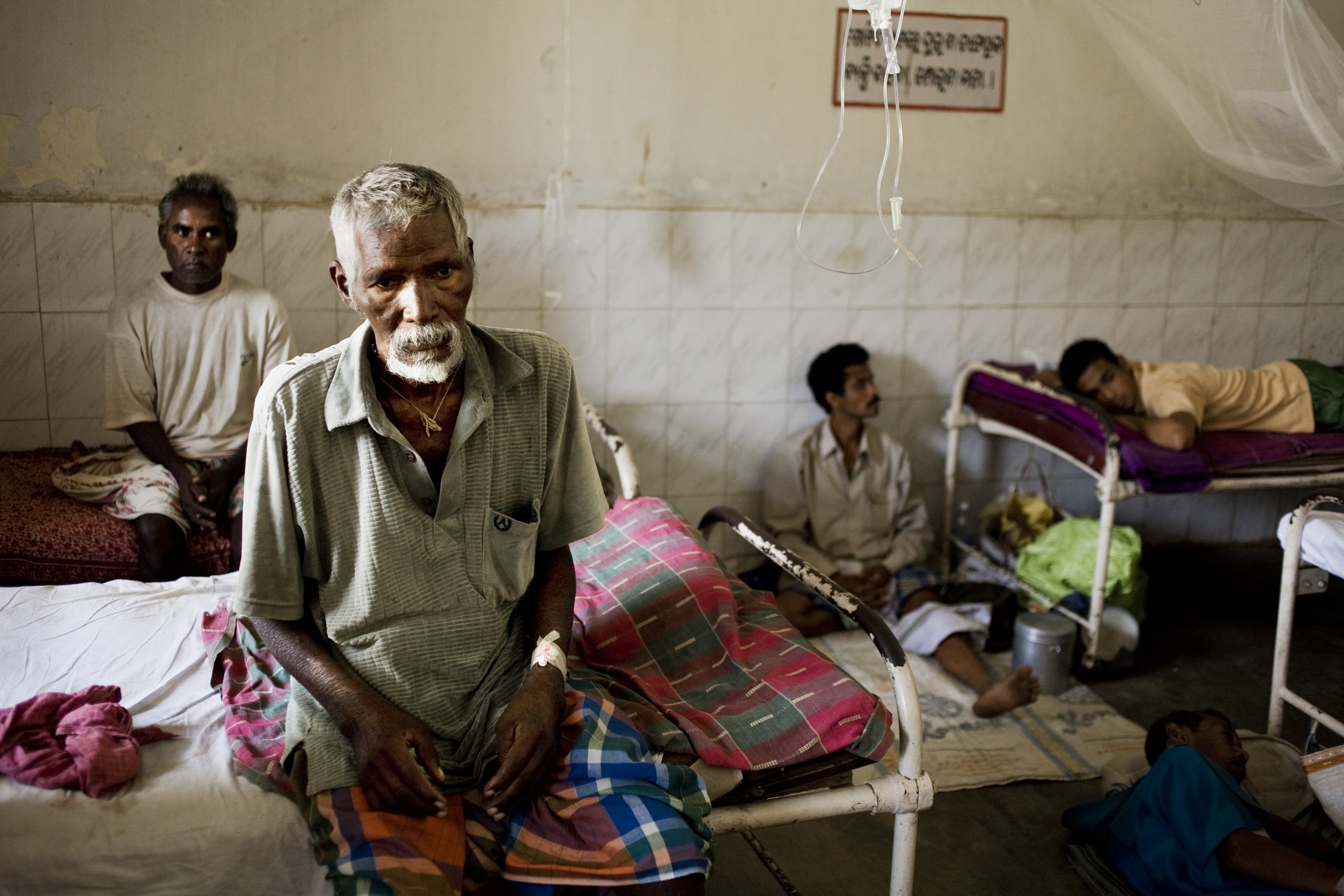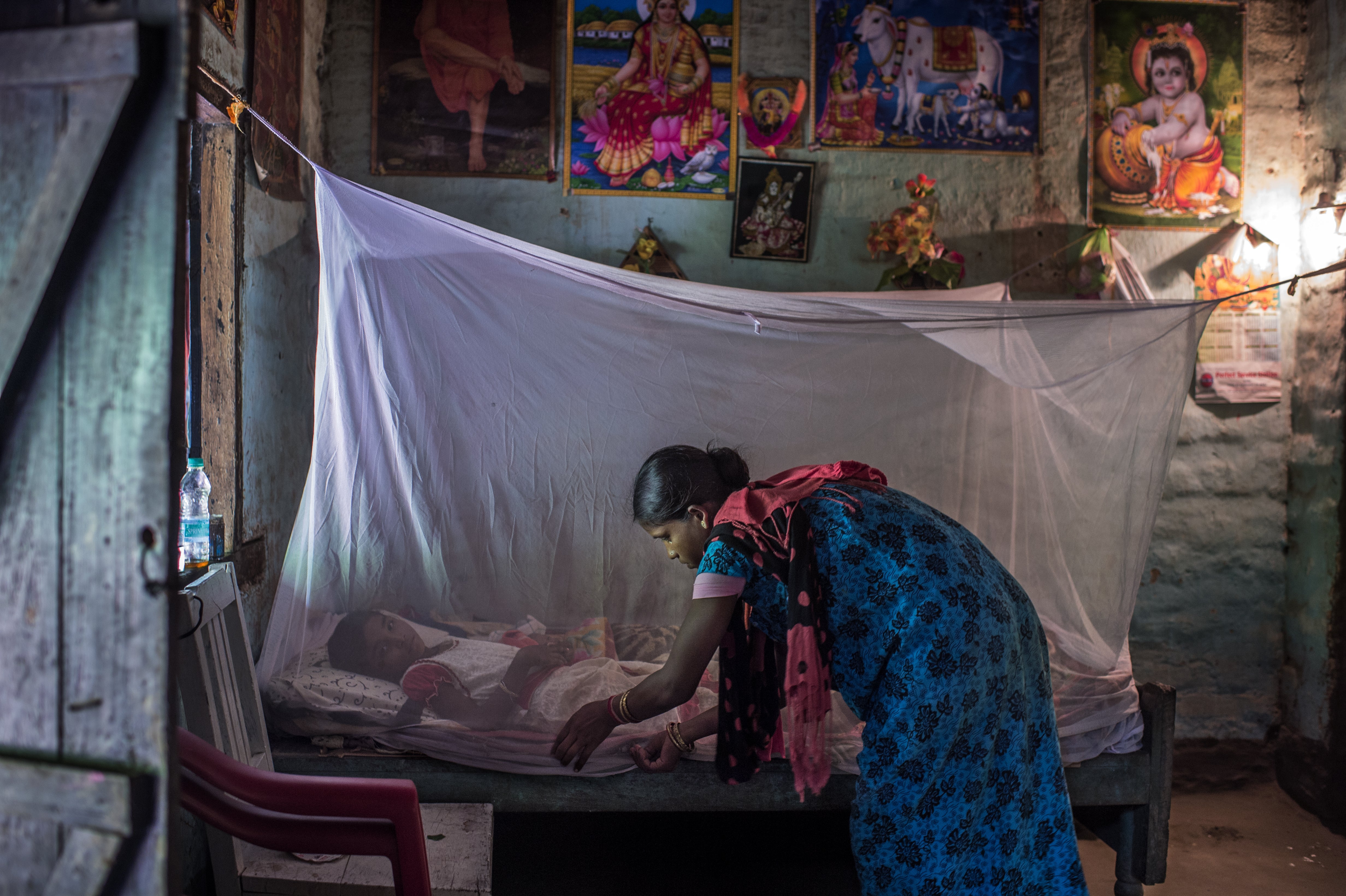Abraar Karan, MPH ’17, wants to launch a long-lasting repellent in countries suffering from malaria and other vector-borne diseases.

By Amy Roeder
For thousands of years, humans have searched for a better insect repellent.
Ancient Egyptians burned lamps filled with castor oil to ward off biting bugs and the scourges they carried, and Romans rubbed their bodies with a mixture of vinegar, oil, and sweet resin. Over the centuries that followed, people tried garlic, rancid animal fat, even mud.
Today, DEET is the ingredient of choice. But while it is highly effective, it has been rated “slightly toxic” by the U.S. Environmental Protection Agency and should be used with some care, especially on young children. It must also be reapplied relatively often. Harvard T.H. Chan School of Public Health alumnus Abraar Karan, MPH ’17, is helping develop what he hopes will be the next game-changing option.
Karan is co-founder of Longsleeve, a company launched with the help of funding from Harvard Business School’s New Venture Competition, which Karan won with business partner Andrew Rothaus, an HBS graduate, in 2018. The pair says that the mosquito repellent they’re developing (also called Longsleeve)—which they hope to eventually test on other disease-causing insects—is waterproof, not sticky or smelly, and is safe to use. Most important, it may last for as long as 72 hours.
The idea for Longsleeve was sparked when Rothaus’ sister-in-law became pregnant while living in Miami during the height of the 2016 Zika virus outbreak. This heightened awareness of his own family’s vulnerability to a mosquito-borne disease got Rothaus thinking about conversations he’d had with Karan, his former Yale undergraduate roommate, about the overwhelming burden faced by people in low- and middle-income countries. According to the World Health Organization, vector- borne illnesses account for more than 17 percent of all infectious diseases, causing more than 700,000 deaths annually. More than half of these are from mosquito-borne malaria.
Rothaus had access to a polymer—a class of versatile chemical compounds used in many consumer products—called the HAPI molecule, which had been patented by his father for use as an adhesive in joint replacement surgery. Rothaus surmised that it could be used to create an insect repellent that would adhere to the skin for more than a few hours. He called up Karan to chew over the idea.

Although he was then not even 30, Karan, now a physician in the Doris and Howard Hiatt Residency in Global Health Equity at Brigham and Women’s Hospital and Harvard Medical School, had already worked in nearly a dozen low- and middle- income countries as a public health researcher, medical student, and clinician. He knew that a long-lasting repellent could be lifesaving for the world’s most vulnerable people and told Rothaus he wanted to partner on the idea. At the time, Karan had taken an interest in epidemic response and was particularly intrigued by the potential for such an intervention to curb new vector-borne outbreaks.
An Indian American who immigrated to California with his parents as a baby, Karan has long been acutely aware that where you live can determine if you live. Fighting to even the odds has been a North Star in his career, as he wrote in a blog post for the Brigham. “I have taken care of men my age who died needlessly of preventable and treatable illnesses, such as malaria and HIV, largely because they were poor and powerless. This is not the type of world I want to live in, and I plan to change it in the small ways that I can.”
Decolonizing global health
Karan didn’t always know that he wanted to be a doctor. While he mulled the possibility, he also felt an intense need to understand the world beyond the clinic. He majored in political science at Yale, tried his hand at journalism and photography, and jumped at every opportunity for fellowships and service travel. But working in medical clinics in India, Nicaragua, and Uganda—where he saw patients in tuberculosis wards dying on the floor as they waited for hospital beds—made an indelible impression. As he told aamc.org, “I was able to witness the impact that medical care could have on improving life for people—almost like magic.”
To Karan, it was unconscionable that people were left to die under such circumstances, yet it was a harsh reality of which most people back in the United States were wholly unaware. “Medicine was a way to give people another chance at life,” he says, “and it was a platform by which I believed we could make important changes in matters of equity, whether that be economic, political, ethical, or otherwise.”
Karan went on to earn a medical degree from the UCLA David Geffen School of Medicine. After graduating from the Harvard Chan School, where he received his MPH in health policy and management, he earned a diploma at the London School of Hygiene & Tropical Medicine. He has continued to write, appearing in such academic journals as the New England Journal of Medicine and The Lancet, as well as in news outlets including NPR, the Los Angeles Times, and the Boston Globe. He has also edited the book Protecting the Health of the Poor and writes a column for the British Medical Journal.
Karan places a premium on a physician’s ability to connect with patients. It’s a theme that also runs through his writing on his global health work, whether he’s reflecting on treating patients who don’t speak his language or on the year he spent studying and working with women in India engaged in sex work. He says the women taught him a lesson in listening without judgment—and he also bonded with them over a shared love of the Indian dance form bhangra.
Despite his many accomplishments, Karan deflects opportunities to boast. He’s learned from working in resource-poor settings that his American accent and the elite schools on his résumé confer an authority that isn’t always warranted. So he makes sure to widen the lens and bring others into the picture to share credit, to empower and build relationships rather than take part in what he calls the “self-congratulatory machine” of global health— academics and health professionals from wealthy countries flying in to “save” poor people in resource-deprived nations and then flying home to receive accolades.
In an essay published last December on NPR, he wrote, “From many of the impoverished patients I have worked with, I have learned that the challenges that help a Western doctor build a career or feel altruistic are the harsh never-ending realities of their life—every year, from birth until death. When we fail to recognize this harsh truth, we end up taking our power for granted. There is nothing more dangerous than that.”
Closing the last mile on malaria
Karan’s work in Rwanda in 2018, where he spent a month on a clinical rotation in a rural hospital with the global health organization Partners In Health, further stoked his impatience to get Longsleeve off the ground. He recalls comforting a terrified young boy who developed a rare malaria complication known as blackwater fever, which causes red blood cells to burst and urine to turn black. At night in his quarters adjacent to the hospital, Karan was kept awake by the sound of buzzing mosquitoes, and he wondered if they were outside his bed net or inside. Wouldn’t it be wonderful, he thought, if Longsleeve could help ease people’s worries and fears?
The product’s first round of tests was promising. Initial results showed that the molecule stayed bound to the skin for 72 hours, and possibly longer. Further showed that only 1 percent of the insects landed—and none of them bit—when tested 24 hours after application. Compared with industry-standard DEET, which lasts for eight hours, Longsleeve shows immense promise.
If the next round of tests shows that repellency lasts for 72 hours, it could be a game changer in curbing malaria transmission, Karan says. When people in vulnerable populations are protected for longer periods, mosquitoes have less opportunity to bite infected individuals and pass along disease. This could help bridge what public health researchers call the “last mile” in disease eradication. “It’s hard to stop transmission in remote areas. Is it worth investing the resources to eliminate or eradicate a disease?” Karan asks. “It could be with a repellent like this.”

Karan and Rothaus hope that in a few years they will be able to launch Longsleeve first in Brazil and
Nigeria, the latter of which accounts for 25 percent of the world’s malaria cases. Ideally, the repellent will be subsidized by investment from wealthier countries, which also need good repellents for their populations.
“We’re not trying to make a profit off of poor areas where people barely have the money to survive,” Karan says. “We want a product that saves people’s lives, that we can sell very cheaply.”
He envisions the product potentially being incorporated into government or public health programs. Prevention can be a hard sell anywhere in the world— particularly if it inconveniences people or requires them to behave outside of their familiar routines. Conceivably, someday, the same community health worker who stops by to see if a patient has taken an antiretroviral medication to prevent AIDS could also check that he or she applied their Longsleeve.
“The success of the product depends on people accepting it and wanting to use it,” Karan says. But he and Rothaus aren’t going to be the ones on the ground doing the convincing. “Hearing from someone they trust, like a community health worker, will go way further. If we do it in a neocolonialist way, it’s not going to work.”
For now, global health strategizing is taking a backseat as testing continues and Rothaus focuses on developing the business side of the company. This gives Karan time to concentrate on his final year of residency before moving into a more active role with Longsleeve. Never one to take on just one thing at a time, he’s also looking at job possibilities in epidemic response. In February, he became an adviser to the Massachusetts Department of Public Health on preparedness for the fast-spreading COVID-19 infection. Working directly with Commissioner Monica Bharel, MPH ’12, he is focused on public health strategy and policy around the crisis—another facet of his dedication to the field of pandemic response.
Longsleeve gives Karan an entrepreneurial outlet for his urgent need to create change. “In the public sector, you get stuck behind a lot of bureaucratic and regulatory hurdles. Progress can be slow. But in the private sector, you’re limited only by yourself, in a way. Once you get the money and make sure that everything is done legally, you can get things done quickly,” he says. “It only takes one idea, one thing to go right, for you to make immense impact and change. And with new disease outbreaks, there’s no time to waste.”
Supporting student innovation and entrepreneurship
Harvard Chan School students not only have big ideas for changing the world—they also have the drive to make these ideas a reality. That’s why a growing number are seeking and creating opportunities to develop and launch entrepreneurial projects as they pursue their studies.
“A decade ago, just a few students were interested in starting their own companies, but now it’s most of them,” says Richard Siegrist, senior lecturer on health care management. He teaches a course of innovation and entrepreneurship and also serves as the School’s liaison with the Harvard Innovation Lab (i-lab), a University-wide resource for incubating new ventures.
Since the fall of 2012, hundreds of Harvard Chan students have participated in i-lab venture teams. Some have gone on to participate in the annual President’s Innovation Challenge to vie for seed funding. A project co-launched by Priya Shankar, MPH ’16, to train Indian girls as peer health educators (featured in the Fall 2016 Harvard Public Health) won runner-up honors in 2016.
For the students Siegrist has mentored, entrepreneurial ideas spring from on-the-ground experiences. “Rather than feeling frustrated and helpless with the way things are, they want to try a new approach and challenge the status quo,” he says. “I think this has wonderful implications for the field.”
Tariana V. Little, DrPH ’20, designed the mobile app FooFii to help health care and social service providers support patients with food insecurity. It’s part of her doctoral thesis, which focuses more broadly on food security financing and service delivery between health care and social service organizations in Greater Boston. While building her own business, Little, a mentee of Siegrist and his innovation course teaching assistant, is also working to nurture more opportunities to build community at the School around entrepreneurship, and opportunities for students to learn from one another.
As a leader of Harvard Chan Public Health Innovation x Technology (PHIT) Student Forum, Little worked with a dedicated team of peers to launch a Hackathon at the School last year. The one-day competition brought together more than 100 students from Harvard and other Massachusetts colleges to form teams to tackle public health problems. It included three tracks: social determinants of health, engaging patients in preventive health, and artificial intelligence in health care. Little, now PHIT president, along with the diverse, cross-campus team she helped convene, planned a second Hackathon for March but postponed it to the fall because of the coronavirus pandemic. The event will include peer talent as speakers, mentors, and judges, part of PHIT’s ethos to create an inclusive space “for students, by students.”
Funding for the Hackathon comes in part from the Sastry Harvard i-lab and Innovation Fund, established by Srinivas Sastry, MPH ’90. The fund also supports students launching ventures at the i-lab, including FooFii.
Sastry sees the ability to collaborate on an entrepreneurial team as a vital skill for students, especially given the current climate of reduced federal funding for public health and medical research. He says that he hopes that giving a boost to innovation and entrepreneurship at the School will inspire the private sector to take more notice of Harvard Chan’s talented faculty and students.
“Entrepreneurship is a path of constant growth and learning,” says Little. “My classmates and I want a path like that. We want to be challenged. We want to be innovators. We are passionate about making positive change and about being creative—because our world demands that. We are young people growing up in a context where the decisions of the past have created difficult conditions for us to grow up in, live in, work in, and age in. So, we need different creative approaches to improving our world. Entrepreneurship allows us that.”
Amy Roeder is associate editor of Harvard Public Health.







